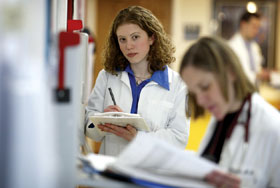Written by Megan Hoffman

“Nursing is a Science at Hopkins,” the majestic banners proclaim upon entering the Johns Hopkins University School of Nursing. I am often reminded that our proud profession is one founded upon the sciences of biology, innovation, and social justice, among others. But, embarrassingly, I had never fully reflected on how great minds and ideas have built science until this year, my second of two in the traditional bachelor of science in nursing program.
I first entered the world of scientific research as an undergraduate biology major. I can remember the day that the wonderful world of PubMed, a medical journal electronic search engine, opened before me. I entered keywords and was amazed by the innumerable research studies that surfaced before my very eyes. Enthralled by the thought that scientists everywhere were hard at work, writing and re-writing the book of science, I was hooked.
Somehow, during the summer before my first year at Johns Hopkins, I set aside my passion for scientific research. Perhaps it was my false belief that my nursing education would be radically different from my other undergraduate degree. Whatever the case, I realize now that my love affair with scientific inquiry took a short vacation.
Imagine my excitement when the world of research returned—this time, the idea was in the form of our undergraduate course, The Research Process in Nursing. Our professor and role model, Dr. Marie Nolan, was a phenomenal guide through the wonders of evidence-based practice. Dr. Nolan invited nurse scientists to speak to our class about the research they have done to improve patient care and the practice of the nursing profession. I realized that scientific research was alive and well in nursing. Nurses everywhere are studying the hows and whys of patient care to implement best practice models while building an environment where research is embraced by the profession.
Recently, I was proud to represent the National Student Nurses Association at a conference for the Student Health Alliance, a newly-formed coalition of health care student organizations. After my class in research, I was already a proponent of the idea that the best nursing care results from formalized clinical investigations rather than informal, word-of-mouth exchanges as to what nurses have deemed effective in the past. Imagine my surprise when the speaker perfectly synthesized what I had learned with her statement holding that: “The plural of anecdote is not evidence.”
I am here for the evidence, and I know this is how my patients will receive the best care. This semester, I gratefully accepted a position as a Fuld Leadership in Clinical Research fellow. Through this program, Drs. Kathleen White and Jo Walrath have paired me with a Hopkins Hospital nursing team to look at the replacement dose system in the Hopkins Children’s Center. By observing and surveying nurses and pharmacists to see how missing doses are handled, we hope to make the process run even more smoothly. The fine tuning of this system will not only help improve CMSC nurses’ efficiency—it will further Johns Hopkins’ commitment to patient safety.
For the school’s commitment to research, for the Fuld Fellowship Program, for the nursing research mentors here, I am proud to be at the Johns Hopkins University School of Nursing. For it is here I have laid the foundation of my practice—where the plural of anecdote is not evidence and where nursing truly is a Science.